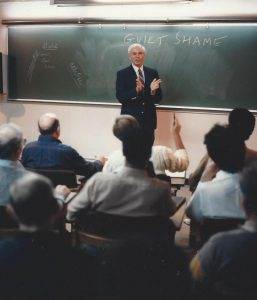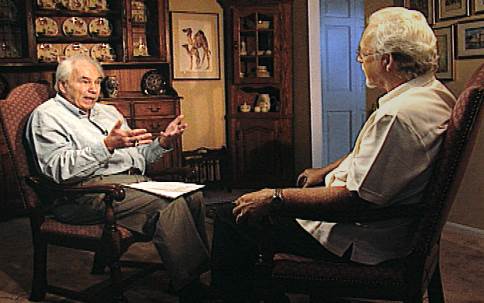Profile
Excerpt from: Ernest Kurtz Profile, Historian as Storyteller and Healer
View/Download
“History and imperfection are my specialties—not necessarily in that order.”
–Ernest Kurtz, 1996

The lives of Fr. Edward Dowling, Sr. Mary Ignatia Gavin, Fr. John C. Ford, Fr. Ralph Pfau, Dr. Austin Ripley, Fr. Joseph Martin, Sr. Therese Golden, and the history of Guest House constitute critical chapters in the larger story of the rise of Alcoholics Anonymous (AA) and the role of spirituality in long-term recovery from alcoholism. It is thus quite fitting that Recovery Through Catholic Eyes is dedicated to Ernest Kurtz, the person most singularly responsible for uncovering and telling this larger story.
Ernest Kurtz published his seminal work, Not-God: A History of Alcoholics Anonymous, in 1979 and has continued his writing and teaching on the topics of AA, spirituality, shame, and storytelling. This final chapter of Recovery Through Catholic Eyes explores and honors his ideas, activities, and sustained influence. The chapter contains four sections: 1) a brief biography, 2) a sampling of the topical themes that permeate Kurtz’s work, 3) a profile of Kurtz the man, and 4) an appendix containing a chronology of the Kurtz publications. The chapter is designed to let Kurtz, and those profoundly influenced by him, speak directly to the reader in their own words.
When I began writing a book in the early 1990s on the history of addiction treatment and recovery in America, several people directed me to Ernie Kurtz as the authoritative source. I had no way of knowing that what I expected to be a brief consultation on the history of AA would evolve into a prolonged mentorship, multiple professional collaborations, and an enduring friendship. Through these years, Ernie Kurtz communicated a number of crucial lessons to me about researching and writing history. He repeatedly challenged:
- Tell the story chronologically (do not confuse your reader).
- Tell the story in context (let your reader know what else is going on around the event you are profiling).
- Present the historical evidence (sources)—all the evidence.
- Separate statements of fact from conjecture and opinion.
- Tell the story from multiple perspectives.
- Localize and personalize the story.
- Stay connected to your readers—keep them wanting to turn the page to find out what happens next (for an elaboration of these, see White, 2004).
I will try to be faithful to these guidelines in telling Ernie’s own story.
Three sources form the foundation of this chapter: the complete publications of Ernie Kurtz (See appendix), taped and transcribed interviews conducted with Ernie Kurtz in 2008 and 2009, and comments solicited from those who have worked professionally with Ernie Kurtz over the past three decades.
Continue reading the full 22 page Ernie Kurtz profile:
View/Download

Ernie Kurtz at Hazelden, 1981
Personal Tribute
Personal Tribute: Ernie Kurtz (1935-2015)
Roger C. Tribute to Ernie Kurtz
Linda Kurtz Tribute to Ernie Kurtz
View
Books
Monographs
White & Kurtz Linking Addiction Treatment and Communities of Recovery: A Primer for Addiction Counselors and Recovery Coaches, 2006
View Download
Articles/Chapters

Ernie Kurtz at Bill Wilson Desk at Stepping Stones
The Tragedy of Southern Religion
1982
Why AA Works: Intellectual Significance of AA
1982
AA as a Phenomenon of American Religious History
1986
Spiritual Rather than Religious: A Contribution of AA
1988
The Spirituality of William James: A Lesson from Alcoholics Anonymous
1990
Shame in the Nineties
1991
Commentary on Lay Treatment
1992
Research on Alcoholics Anonymous: The Historical Context
1992
AA Grapevine History
1993
Drs. Miller & Kurtz on Models of Alcoholism
1994
Miller and Kurtz Models of Alcoholism
1994
Foreword Moderate Drinking
1996
Spirituality and Recovery: The Historical Journey
1996
What Ever Happened to Twelve Step Programs?
1996
Varieties of the Alcoholics Anonymous Experience
1997
Spirituality and Psychotherapy The Historical Context
1998
AA and the Disease Concept
2002
Robinson Brower & Kurtz Spirituality of Persons Entering Alcoholism Treatment
2003
Telephone/Internet Recovery Support
2007
White & Kurtz Twelve Defining Moments in the History of Alcoholics Anonymous
2008
White & Kurtz A Message of Tolerance and Celebration: Multiple Pathways of Recovery in the Writings of Alcoholics Anonymous co-founder Bill Wilson
2010
White & Kurtz The Varieties of Recovery Experience
2011
Strobbe and Kurtz Narratives of Recovery
2012
Flaherty, Kurtz, White, & Larson Secular, Spiritual, and Religious Pathways of Long-term Addiction Recovery
2014
- View the Flaherty, Kurtz, White, & Larson Secular, Spiritual, and Religious Pathways of Long-term Addiction Recovery file
- Download the Flaherty, Kurtz, White, & Larson Secular, Spiritual, and Religious Pathways of Long-term Addiction Recovery file
Spirituality and Addiction Recovery
2014
Kurtz and White Recovery Spirituality
2015
Ernie Kurtz, Recovery, and the Power of Story
2020
Blogs
Kurtz and White AA Agnostic and the Varieties of AA Experience
Other
The Combined Addiction Disease Chronologies of William White, Ernie Kurtz, and Caroline Acker
2001
Foreword, Don't Tell: Essays from AA Agnostica
2014
Audio/Video Interviews

2009 Ernie Kurtz on the history of A.A., spirituality, shame and storytelling. Great Lakes Addiction Technology Transfer Center (DVD of three interviews by B. White).
2009
Radio Interview—Experiencing Spirituality (Voice of American Radio Interview) [mp3 audio file]
2014
Download
Edited Transcripts
Reflections on the history of Alcoholics Anonymous: An Interview with Ernie Kurtz
2009